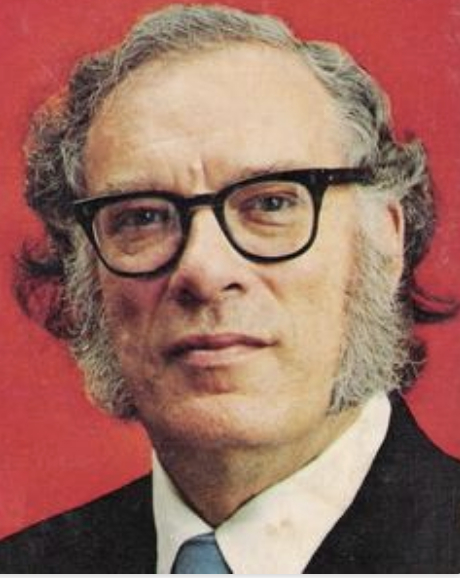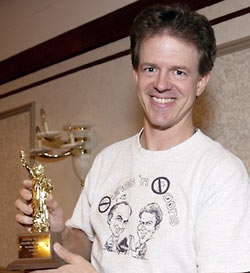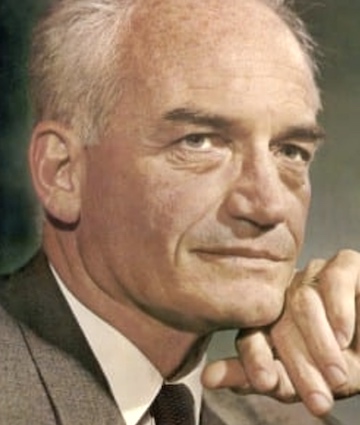January 2
Isaac Asimov

On this day in 1920, Isaac Asimov, a self-described “second-generation freethinker” and one of the world’s most prolific authors, was born in Petrovichi, Russia. He moved with his family to Brooklyn, New York, in 1923 and became a naturalized citizen in 1928. He sold one of his earliest published short stories, “Nightfall,” in 1941, which was eventually voted the best science-fiction short story ever written, by the Science Fiction Writers of America.
Asimov graduated from Columbia University in 1939, earned his M.A. in 1941 and a Ph.D. in chemistry in 1948. He was hired by Boston University’s School of Medicine to teach biochemistry the following year. He became an associate professor of biochemistry in 1955 and professor in 1979, although he stopped teaching in 1958 to devote his life to writing.
I, Robot (1950) was the title of his first collection of short stories. Employing the “Asimovian Law of Composition,” which meant writing from nine to five, seven days a week (often closer to 6:30 a.m. to 10 p.m.), he averaged at least 12 new books a year. Asimov won five Hugos, three Nebula Awards, and his best-known “Foundation” trilogy was given a 1966 Hugo as “Best All-Time Science-Fiction Series.” Nonfiction works by Asimov were typically encyclopedic in range, such as his well-known Asimov’s Guide to the Bible (1968) and Asimov’s Annotated Paradise Lost (1974). He wrote a series of popular books on science and history, and even a guide to Shakespeare.
Asimov was an atheist: “I am Jewish in the sense that if an Arab wanted to throw a rock at a Jew, I would qualify as a target as far as he was concerned. However, I do not practice Judaism or any other religion.” (March 17, 1969 letter.) “Properly read, the Bible is the most potent force for atheism ever conceived.” (Feb. 22, 1966 letter.) He published 470 books, covering every category in the Dewey Decimal System, fiction and nonfiction.
Asimov was married twice and had a son and daughter from his first marriage. His death at age 72 from heart and kidney failure was a consequence of AIDS, a fact later revealed by his wife Janet Asimov. (D. 1992)
“Just the force of rational argument in the end cannot be withstood.”
— Asimov, solstice speech to the New Jersey Freedom From Religion Foundation (Dec. 22, 1985)
Steve Benson

On this date in 1954, Pulitzer Prize-winning editorial cartoonist Stephen Reed “Steve” Benson was born in Sacramento, Calif., the grandson of Ezra Taft Benson, who served as secretary of agriculture under President Dwight Eisenhower and became president of the Mormons (1985-94). Benson was an Eagle Scout and graduated with a degree in political science, cum laude, from Brigham Young University in 1979. “I was on track to eternal Mormon stardom, reserved especially for faithful men in a church run by men,” he has written.
He worked briefly as an editorial cartoonist for the Morning News Tribune in Tacoma, Wash., before starting a long association as a cartoonist with the Arizona Republic in 1980, where he won a Pulitzer Prize in 1993. He and his wife Mary Ann, who had four children, left the Mormon Church in a highly publicized break in 1993, “citing disagreement over its doctrines on race, women, intellectual freedom and fanciful storytelling.” In a 1999 speech at FFRF’s national convention in San Antonio, he called himself “a Latter-day Ain’t.”
Benson listed among the benefits of leaving religion: “Another day off, a 10-percent raise and getting to choose his own underwear.” Among his favorite sayings was Mark Twain’s adage “Get your facts first, and then you can distort them as much as you please.”
An atheist, he has appeared at several FFRF annual conventions. He received a Tell It Like It Is Award (1999), an Emperor Has No Clothes Award (2002) and a Friend of Freedom Award (2003). The inspiration for the Freedom Award, a statuette of liberty, came from Benson’s cartoon that year. In the cartoon, filmmaker Michael Moore was pictured at the Academy Awards, where he won an Oscar for “best documentary,” holding not an Oscar but a small replica of the Statue of Liberty.
For several years starting in 2001, Benson teamed up with FFRF Co-President Dan Barker for the inimitable “Tunes and ‘Toons” production, an irreverent look at freethought and religion in the news. Some of their jointly written parodies, “Godless America” among them, are recorded on the “Beware of Dogma” CD.
He started a new chapter in his life in 2020 when he married Claire Ferguson. He suffered a debilitating stroke in 2024 from which he never fully recovered and died at age 71. His fascinating career and long association with FFRF are further detailed in this posthumous tribute. (D. 2025)
“If, as the true believers claim, the word ‘gospel’ means good news, then the good news for me is that there is no gospel, other than what I can define for myself, by observation and conscience. As a freethinking human being, I have come not to favor or fear religion, but to face and fight it as an impediment to civilized advancement.”
— Benson, "From Latter-Day Saint to Latter Day Ain't" (Freethought Today, December 1999)
Dax Shepard

On this date in 1975, Dax Randall Shepard was born in suburban Detroit, the son of Laura LaBo, who worked at General Motors, and David Shepard, a car salesman. He was named Dax for Diogenes Alejandro Xenos, the wealthy playboy in Harold Robbins’ novel “The Adventurers.” His parents divorced when he was 3.
After high school graduation he enrolled in a school operated by the Groundlings, an improvisational and sketch comedy troupe based on Melrose Avenue in Los Angeles. He’d always known he could be funny but had stage fright about doing stand-up in Detroit so he moved to California, thinking “that commitment would force him to do it.” (2014 interview with Marc Maron) He attended Groundlings classes while enrolled at UCLA, where he graduated magna cum laude with a B.A. in anthropology in 2000.
In 2003 he joined the cast of “Punk’d,” a hidden camera, practical joke reality show created by Ashton Kutcher and Jason Goldberg that aired on MTV. In 2004 he starred in “Without a Paddle” with Seth Green and Matthew Lillard, followed by roles in “Employee of the Month” with Dane Cook and Jessica Simpson (2006), “Idiocracy” (2006), “Let’s Go to Prison” (2006) and “Baby Mama” (2008) with Tina Fey and Amy Poehler.
In 2010 he wrote, directed and starred in the low-budget mockumentary “Brother’s Justice” and had a supporting role in the rom-com “When in Rome, which starred his future wife Kristen Bell. From 2010-15 he played Crosby Braverman in the NBC drama “Parenthood.” His other movies since then as of this writing include “Hit and Run” with Bell and Bradley Cooper (2012), “The Judge” (2014), “CHiPs” and “El Camino Christmas” (2017).
His ad with Bell for the Samsung Galaxy Tab S tablet in 2014 garnered over 20 million YouTube views. In 2018 he launched the podcast “Armchair Expert” with co-host Monica Padman. It features the lives of celebrity guests and was the most popular new podcast on iTunes in 2018.
Shepard and Bell started dating in 2007 and got engaged in 2010 but refused to marry until California legalized same-sex unions, which happened in 2013. They have two daughters, Lincoln and Delta. He’s an atheist and Bell is also nonreligious. In 2013 she told Australian Women’s Health that they start their days with a 20-minute transcendental meditation session, sometimes holding hands. On his Twitter account, he describes himself as “Humanist. Comedic actor who is light on both comedy and acting. Alt Centrist.”
PHOTO: Shepard at PaleyFest 2013 in Los Angeles; photo by Genevieve under CC 2.0 Generic.
“I’m an atheist. Slow your roll :)”
— Shepard tweet replying to @JusPressPlay @PerezHilton (March 14, 2017)
Barry Goldwater (Quotes)

Barry Goldwater, a former Arizona U.S. senator and 1964 presidential candidate who was born on this day in 1908 and died in 1998, held traditional Republican conservative views on most issues but was also adamant about keeping state and church separate. His father was Jewish and converted to his wife’s Episcopalian beliefs, which his son adhered to while admitting he rarely got to church due to his busy lifestyle. Goldwater’s remarks below are from a 1981 Senate speech.
“One of the great strengths of our political system always has been our tendency to keep religious issues in the background. By maintaining the separation of church and state, the United States has avoided the intolerance which has so divided the rest of the world with religious wars.”
“There is no position on which people are so immovable as their religious beliefs. There is no more powerful ally one can claim in a debate than Jesus Christ, or God, or Allah, or whatever one calls this supreme being. … The religious factions that are growing throughout our land are not using their religious clout with wisdom. They are trying to force government leaders into following their position 100 percent.”
“I’m frankly sick and tired of the political preachers across this country telling me as a citizen that if I want to be a moral person, I must believe in A, B, C and D. Just who do they think they are? And from where do they presume to claim the right to dictate their moral beliefs to me?”
“The religious factions will go on imposing their will on others unless the decent people connected to them recognize that religion has no place in public policy. … We have succeeded for 205 years in keeping the affairs of state separate from the uncompromising idealism of religious groups and we mustn’t stop now.”
— Congressional Record (Sept. 15, 1981)
